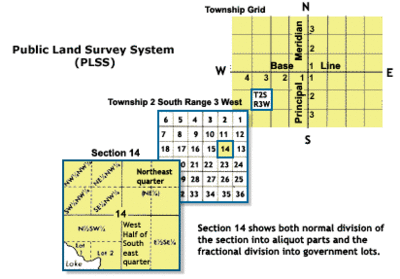Early Public Land Survey System (PLSS) Plats
The Land Ordinance of 1785 to survey land ceded to the United States by the Treaty of Paris in 1783, following the end of the American Revolution. Beginning with the Seven Ranges in present-day Ohio, the Public Land Survey System (PLSS) has been used as the primary survey method in the United States. Following the passage of the Northwest Ordinance in 1787.
The Public Land Survey System (PLSS) has been used to survey and describe land in the United States nearly everywhere other than the original colonies. It provided a uniform method for describing land based on a grid aligned to a baseline. In Washington and Oregon the baseline is the Willamette Meridian, which passes through Portland, OR. From there a grid is laid out to define townships. Each township is an approximately six mile by six mile square which is further divided into 36 sections, each approximately a mile on each side.
The townships are numbered by their relative position from the William Meridian. Reardan itself is in a Township designated T25N R39E, which means Township 25 North Range 39 East, or the 25th row of townships north and the 39 column east of the Willamette meridian.
Sections are numbered in a special way, starting from the north east corner of the township is section 1. To the west of it are sections 2, 3, 4 ,5 and finally 6 on the western boundary of the township. The next section 7, is immediately south of section 6. The remaining sections are numbered in this serpentine fashion. Every section is physically adjacent to the sections numerically adjacent. This method of numbering is called Boustrophedon.
Sections 16 and 36 were originally reserved for schools. The thought being that the land would provide income to operate the school in the area. In this area the odd numbered sections were deeded to the Northern Pacific Railroad Company to compensate it for building the railroad. Homesteaders could settle on on goverment owned land (around Reardan this was even numbered sections, except 16 and 36) and try to satisfy the requirements to establish a homestead. Those that succeeded with the requirements granted a "land patent" from the government. Other pioneers just purchased land from railroad or from the government.
Each section was normally subdivided into "quarters" which were a half mile on a side and nominally contained 160 acres. It quarter could be further divided into quarters of 40 acres each. This subdivision was left to private surveyors and was used in areas where the land was more marginal. It does happen around Reardan, but it is not very common. Quarters are normally referred to by their position. The NW quarter or the SE quarter of the NE quarter. When a quarter has less than its nominal acreage, it is referred to by a lot number which can vary from section to section. One must refer to a plat to determine the position of a particular lot.
The reason that the measurement is approximate if that the earth is round so that "parallel" north-south lines get closer together as you get closer to the poles. Typically the southeast corner of the township is laid out first and from there, the outline of the township is established and then the sections within the township. This is done astrologically or by determining position from the stars. The sections on the western and northern edges of the township are adjusted to fit the astrological boundaries of the township, so these sections may not be one mile by one mile.
The homestead act generally limited land transactions to a quarter section of land. So a quarter occupying could be specified as the NW quarter, NW 1/4 or NW/4. This site uses he latter notation.
Around Reardan these adjustments are quite apparent in the boundary between townships in Range 24 N and Range 25N. There is an "adjustment" of the north-south section lines at this interface of about 100 feet. This is visible in the shift of the Waukon road and other roads that cross this boundary. Also the northern sections of Range 24N are substantially larger than other sections making them approximately 1-5/8 mile by 1 mile. This happens again just south of Sprague between Range 20N and 21N. Here the shift is much greater and the size of the northern sections is reduced to a little over a half mile by a mile. So the adjustments are not equal or similar.
| Township | R37E | R38E | R39E | R40E | R41E | R42E |
|---|---|---|---|---|---|---|
| T27N | ||||||
| T26N | ||||||
| T25N | ||||||
| T24N | ||||||
| T23N | ||||||
| T22N |






















